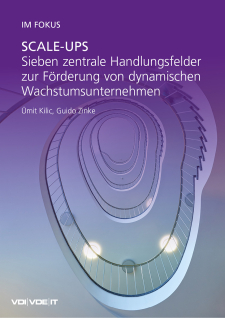
The Society and Innovation Department analyses and fosters the conditions required for the emergence and development of innovation and innovation systems. We observe and analyse the driving forces and barriers in the areas of technology, the private sector and society. Besides our scientific analysis and strategic foresight activities, we also support specific research and development projects and technological start-up businesses. We are experts for federal funding measures. We help to shape the measures, analyse their impact and derive recommendations for stakeholders in policy-making processes that relate to technology and innovation. We develop and apply methods and formats to transfer knowledge between science, the private sector and society.
The Society and Innovation Department consists of six sections:
- Innovation Policy, Evaluation and Monitoring
- Analysis and Design of Digital Change
- Artificial Intelligence and Future Technologies
- Transfer, Transformation and Social Innovation
- Start-ups, Business Models, Innovation Ecosystems
Across these sections, we
- conduct studies that analyse the prerequisites for and the consequences of innovation.
- are involved in the formation and implementation of innovation policy measures – as a programme management agency.
- analyse the interdependencies of societal, technical and economic aspects – through accompanying research projects and innovation support measures.
- conduct programme evaluations to examine the effectiveness of research and development programmes.
- support start-up businesses and young companies in the information and communications sectors with coaching and consultancy.
- act as intermediary between various interest groups in the public sector, private sector and scientific community by conducting workshops, conferences and background discussions.
Our Sections: Specialisms And Members
- ‘Innovation Policy, Evaluation & Monitoring’ Section
Led by Dr. Leo Wangler
Strategic advice on innovation policy issues and their implementation as well as the preparation of information relevant for action are central topics of this group. An essential task is the identification, analysis, observation and evaluation of trends, topics and developments in the areas of research, development and innovation, as well as the development of concepts and strategic bases for decision-making. This is evident, for example, in the further development of funding measures and innovation strategies.
Furthermore, we evaluate intended and non-intended effects of innovation policy measures at the micro and macro level in the sense of an evidence-based innovation policy and draw conclusions on their effectiveness and efficiency.
We develop answers to the challenge of an increasing complexity of processes and actors in the innovation policy environment, provide indications for new methods of evaluation and apply them.- ‘Analysis and Design of Digital Change’ Section
Led by Dr. Carolin Thiem
Digitalisation and the opportunities associated with the Internet are making fundamental and permanent changes to society and the economy. This section takes an analytical and conceptual approach to the contexts surrounding these developments. It investigates the effects of the increasing diffusion of digital products, processes and services and it explores the options for shaping the way things progress. By taking an interdisciplinary, holistic view of digitalisation, the section focuses on the conditions that inhibit and encourage digitalisation and on the interplays between the dynamics of the trends in research, technology, business and wider society. To do this, it is in dialogue with the groups and stakeholders that are affected. This section views itself as a service provider that offers analysis, support and scientific guidance about innovations birthed by digital technologies – and about the discourses and transformation processes that these innovations bring about in all areas of life and work. The section is particularly interested in the non-technological implications of digital transformation. Examples of these include changes in attitude and trust/approval, changes to communication, cultures and structures and even changes to the power balance.
- ‘Artificial Intelligence and Future Technologies’ Section
Led by Dr. Steffen Wischmann
Shaping an economically, ecologically and technically sustainable digital future is one of the greatest current challenges for Germany as a business location. One of the core objectives of the "Artificial Intelligence and Future Technology" group is to contribute to this shaping within the framework of innovation policy measures. This is achieved through highly interdisciplinary cooperation within the group with expertise on the state of technological progress, research and economic feasibility. The focus is on data and AI-based technologies along the entire value chain in ecosystems that emerge with digital products, processes and services.
In this context, we accompany technology programmes and work together on legal, technical, regulatory and exploitation-oriented cross-cutting issues. We ensure an effective transfer of knowledge to the expert communities and the general public. We build networks between our customers and clients and the key players and organise an efficient exchange at all levels. We compile potential and technology analyses, market studies, guidelines, concept papers and benchmarking studies in order to provide important impulses for politics, economy, research and society.
- ‘Transfer, Transformation and Social Innovation’ Section
Led by Miriam Kreibich
Due to systemic challenges, there is a need for an expanded understanding of innovation, which considers technological and social innovations in equal measure and takes changing innovation processes, players and target groups of innovation into account. With a special focus on social innovations, central questions are addressed that deal with the transfer from and into society as well as with changing transfer paths into application and utilisation. We observe and analyse new instruments, methods and speeds of transfer in order to advise and support state and federal ministries in the development of transfer measures for technological and social innovations in research, economy and society in the scope of open-topic measures.
In addition to purposive monitoring, we analyse obstacles and opportunities of new cooperation models and social practices. We develop innovative, agile funding and communication formats as well as strategies that can be transferred to other players, sectors or industries - in the sense of an open innovation culture.- Start-ups, Business Models, Innovation Ecosystems
Led by Guido Zinke
With a distinctive application orientation and a strong mix of technical, methodological and thematic competences, the group's view ranges from the exploitation nucleus of an innovation – the business model – to questions of start-up support and the design of innovation ecosystems (exchange networks of start-ups, innovating companies, scientific institutions and other players) to market, competitive and political boundary conditions of innovative companies.
Within the framework of accompanying research and start-up competitions, we train and support R&D project managers and founders in business model development and impart relevant knowledge along the entire start-up process. On behalf of federal and state ministries, we analyse and advise on issues related to new funding instruments, regulatory framework conditions or the (further) development of start-up and innovation ecosystems. We also implement funding programmes for spin-offs from science and start-ups. In addition, we share our methodological know-how and continuously develop new tools and methods, especially for business model development.
